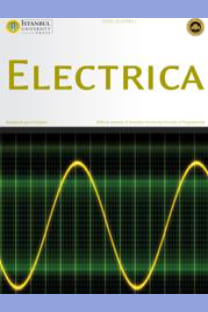Power-Efficient Viterbi Decoder Architecture and Field Programmeble Gate Arrays Fpga Implementation
___
I. Lee and J.L. Sonntag, “A new architecture for the fast Viterbi algorithm,” IEEE Global Telecommunications Conference, San Francisco, vol. 3, pp. 1664-1668, Nov., 2000.M. Benaissa, and Y. Zhu, “A Novel High-Speed Configurable Viterbi Decoder for Broadband Access,” EURASIP Journal on Applied Signal Processing, pp. 1317-1327, 2003. [CrossRef]
Y. Zhu and M. Benaissa, “Reconfigurable Viterbi decoding using a new ACS pipelining technique,” Proceedings of the 2003 IEEE international conference on Application-Specific Systems, Architectures, and Processors (ASAP2003), The Hague, The Netherlands, pp. 360-368., 24-26 June 2003. [CrossRef]
K. Page, P. M. Chau, “Improved Architectures for the Add-Compare-Select Operation in Long Constraint Length Viterbi Decoding,” IEEE J. Solid-State Circuits, vol. 33, pp. 151-155, no. 1, January 1998.
I. Kang and A. Willson, “Low-Power Viterbi Decoder for CDMA Mobile Terminals,” IEEE J. of Solid-State Circ., vol. 33, no. 3, pp. 473-482, Mar. 1998. [CrossRef]
Y. Gang, T. Arslan, A. T. Erdogan, “An Efficient Pre-Traceback Approach for Viterbi Decoding in Wireless Communicationİ” ISCAS 2005, IEEE International Symposium on Circuits and Systems, vol. 6, pp. 5441- 5444, May, 2005.
R. Tessier, S. Swaminathan, R. Ramaswamy, D. Goeckel, W. Burleson, “A Reconfigurable, Power-Efficient Adaptive Viterbi Decoder,” IEEE Transactions On Very Large Scale Integration (VLSI) Systems, vol. 13, no. 4, pp. 484-488, April, 2005.
A. Dinhand and H. Xiao, “A Hardware-Efficient Technique to Implement a Trellis Code Modulation Decoder,” IEEE Transactions On Very Large Scale Integration (VLSI) Systems, vol. 13, no. 6, pp. 745750, June, 2005.
Y.C. Tang, D. C. Hu, , W. Wei, W. C. Lin, H. Lin, “A Memory-Efficient Architecture for Low Latency Viterbi Decoders,” 2009 International Symposium on VLSI Design, Automation and Test, 28-30 April, 2009.
K. Cholan, “Design and Implementation of Low Power High Speed Viterbi Decoder,” International Conference on Communication Technology and System Design, vol.30, pp.61-68, 2011.
S.L. Latha and D.L. Kumari, “Low-Power Adaptive Viterbi Decoder for TCM Using T-Algorithm,” International Journal of Scientific and Research Publications, vol. 3, no. 8, August, 2013.
N. Bhatt, M. Shah, B. Asodoriya, “FPGA Implementation Of Power Efficient Low Latency Viterbi Decoder,” Indianternational Journal of Engineering Research & Technology (IJERT), vol. 2, no 5, May, 2013.
R. I. Thakre, “Design of T-Algorithm Based High-Speed Low-Power Viterbi Decoder for TCM Decoders”, International Journal of Innovative Research in Electronics and Communications (IJIREC), vol. 1, no. 1, pp. 33-38, April, 2014.
V.G. Kumar and A. C. Sudhir, “Implementation of Viterbi Decoder using T-algorithm for TCM Decoders,” International Journal of Innovative Research in Electrical, Electronics, Instrumentation and Control Engineering, vol. 3, no 5, May, 2015.
P. J. Black and T. H. Meng, “A 140-Mb/s, 32-state radix-4 Viterbi Decoder”, IEEE J. Solid-State Circuits, vol. 27, pp. 1877-1885, Dec. 1992. [CrossRef]
N. Bruels, E. Sicheneder, M. Loew, A. Schackow, J. Gliese, C. Sauer, “A 2.8 Gb/s, 32-State, Radix-4 Viterbi Decoder Add-Compare-Select Unit”, Symposium on VLSI Circuits Digest of Technical Papers, pp. 170-173, June, 2004. [CrossRef]
I.C. Yilmaz, “Design and Simulation of Soft Decision Viterbi Decoder”, Department of Electrical and Electronics Engineering, Çukurova University Institute of Natural and Aplied Sciences, MSc. Thesis, 2011.
- ISSN: 2619-9831
- Yayın Aralığı: 3
- Başlangıç: 2001
- Yayıncı: İstanbul Üniversitesi-Cerrahpaşa
An Operational Transconductance Amplifier-based Memcapacitor and Meminductor
Corona Identification of Impulse Voltage and Current
A Highly Linear Wide-Band Tunable Lna for Military Radio Applications
Power-Efficient Viterbi Decoder Architecture and Field Programmeble Gate Arrays Fpga Implementation
Recurrence Plot Analysis of Unsatured Polyester Samples Subjected to Contamination
AYSEL ERSOY YILMAZ, MEHMET MURAT İSPİRLİ
A Comparative Study of Empirical and Variational Mode Decomposition on High Voltage Discharges
A New Approach for Detection of Pathological Voice Disorders with Reduced Parameters
ALİ BOYACI, ALİ RIZA EKTİ, SERHAN YARKAN, MUHAMMED ALİ AYDIN
Current and Voltage Mode Quadrature Oscillator Based on Voltage Differencing Buffered Amplifier
